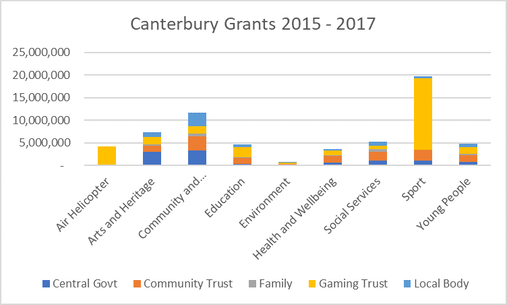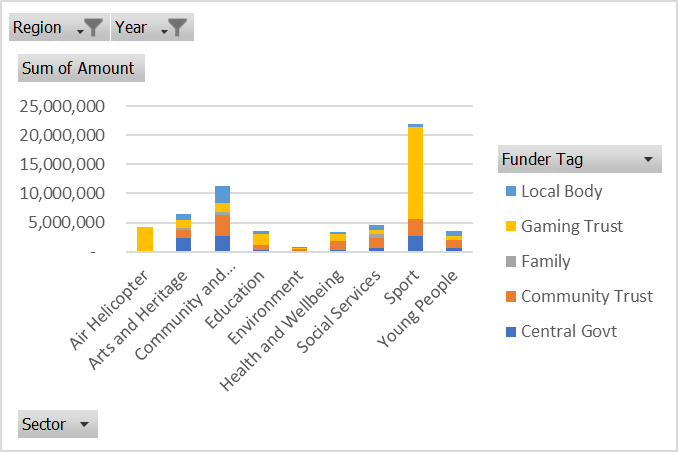
My last blog has sparked a wee bit of conversation, so I thought it may be helpful for organisations to explore the numbers further. I am already seeing how the reduction in funding, particularly gaming trust, is manifesting itself, with letters from various organisations and public appeals now doing the rounds.
It will be difficult for the community to dig deep, particularly with the uncertainty of what lies ahead over many people.
This chart looks at three years of data, over 12000 grants. I take each grant and categorise it with a bunch of useful parameters. I have then averaged the annual amount given. This chart simply shows the sectors that the various funding buckets put their money into. We can see that sport is the biggest recipient of grants in the Canterbury region.
What I want to focus on is the gaming trust contribution to third sector groups. In the last blog I estimated that nationally, gaming trust giving will be down $120,000,000 this year. That’s a drop of 40% of total giving from that sector. Indeed, although saddened, I was vindicated on this by Martin Cheer from Pub Charity who proffered the same number in a recent interview on National Radio.
Let’s look at the local effect. Canterbury has around 10% of grants into the area. There are a couple of little system quirks however.
For purpose Class 4 trusts give have some preferred organisations they give to. We have two of these in Canterbury: Air Rescue and Community Services, who give to the Canterbury West Coast Air Rescue Trust, and Mainland Foundation, whose primary purpose is amateur rugby union north of the Waitaki including the West Coast. The impact on these organisations is different: the air rescue pretty much gets all of its grant money from their gaming trust, while rugby (last time I looked) gets just over half of their money from Mainland Foundation.
What I have done is assume that Canterbury gaming drops $12m. I have then assumed that Air Rescue will maintain their giving to the rescue helicopters, but that rugby drops with everyone else. I then assume that groups get what they got in the past, just scaled back amounts.
This chart then shows the effect of this. It’s a wee bit complicated so let me explain. The first column is the average of 2015 – 2017 gaming trusts grants allocated by sector. The second includes my scaling back of grants given the pandemic effect. The third column is the average amount given by all other funders, which I am assuming won’t change over the next financial year (big assumption). The fourth column sums what we would expect without the pandemic. The second to last column shows the total projected dollar effect on various sectors, and the final column the percentage drop for each sector.


But which ones? Here is a cut of Canterbury sporting codes by Average 2015 – 2017 total grants, with the amounts adjusted down for the 39% anticipated drop. Using averages reduces the lumpy effect of capex.
The effect of reductions in grant funding on many of these codes obvious. Will it impact player numbers? Possibly not, although I can envisage more calls for access to sport as the pandemic increases poverty within the nation. Will it impact how clubs are run? I imagine so. I have not looked at other sources of income for clubs at a macro level as grants are my thing, although I have looked at a few organisations historically and noticed that, with grant income, expenses have risen, particularly around people costs.
The other big loser under this scenario is education with a loss of 23%. Often this money goes to school sport programmes, so there’s a further hit to sport. Of course, a lot of capex for schools, such as play grounds and other small assets. However, there does seem to be a high decile skew around this, so it may be that parents will need to be asked to stump up with a bit more around donations if they want the same. Of course, the bigger effect to schools will be the loss of international student income, which again exposes the fragile funding ecosystem for possibly one of the most important jobs we ask our state to do.
The impact of the COVID pandemic is going to have a profound effect upon how third sector organisations deliver their services. It exposes a funding ecosystem in New Zealand where around 2/3 of the grant money coming to communities comes from gambling activities. It exposes chronic underfunding of core service delivery by government, increases in demand for money by groups for cash, and a rise of professional staff (and their resultant cost) within third sector organisations tasked with getting that diminishing pool of grants and private philanthropy.
What are the answers? If I knew that I wouldn’t be writing this. But I do know that if we want to make some systemic changes, the opportunity is now, so let’s get those ecosystem conversations going.
I write about this stuff as believe that as need to understand where funding comes from, where it goes, and how it gets there. As a citizenry we allow both those supplying money and those asking for money to operate, and as a community we need to ensure we have oversight over the organisations they choose to fund. Love to talk with you if you think this is at all interesting, and if you want to dive into the data a bit more than happy to do so. Check out my website http://www.delfi.co.nz/



 RSS Feed
RSS Feed